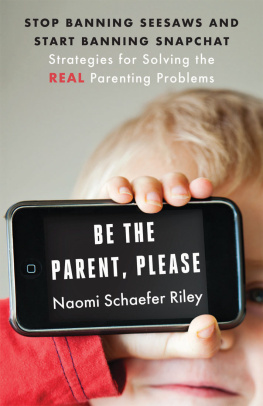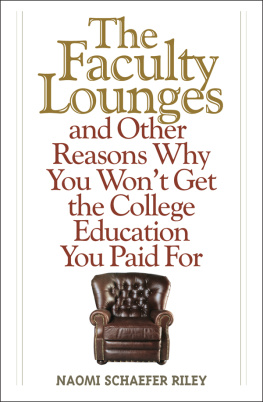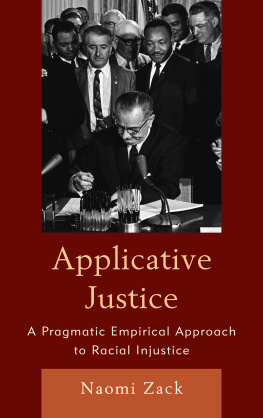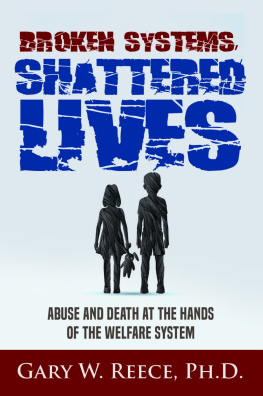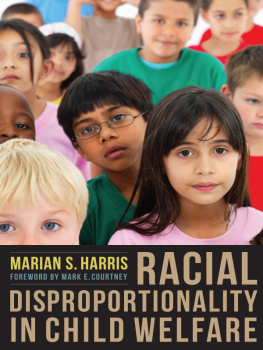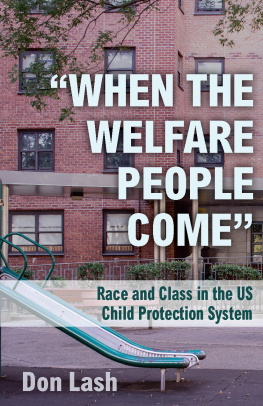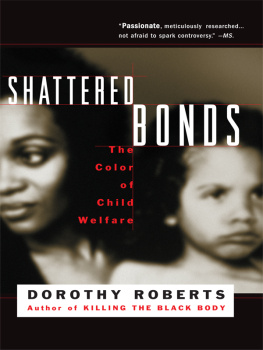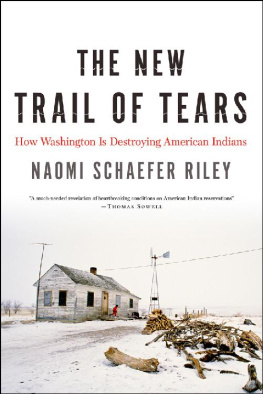Advance Praise for
No Way to Treat a Child
Naomi Schaefer Riley brings to the forefront a crucial question, which is foundational to the design of a compassionate and safe child welfare system in the United States. Her analysis and keen insights are more than worth a read. Her dedication and passion for this work continues to inspire me. Mary L. Landrieu, former U.S. Senator (D-LA)
Anyone who cares about the disappeared children of America should read this book. Naomi Schaefer Riley is one of the few people who will tell the truth about what really goes on in the lives of children who have been removed from their parents care by the state. These children end up pawns in a great politically-motivated shuffle that often serves only to break their most important attachments; to leave them languishing for permanent placements until the right kind of parent can be chosen by the state; or returned to dangerous situations. Sent from placement to placementand school to schoolthey quickly suffer emotional and educational losses that cant be repaired. I dont know of any writer who reports as deeply and writes as honestly as NSR. At the very least, she bears witness to what weve all chosen to ignore. We all have a stake in this situation. Caitlin Flanagan, staff writer, Th e Atlantic
Harrowing yet full of heart, No Way to Treat a Child tells the searing tale of how political correctness is harming the smallest and weakest among us: kids who need homes. Kudos to Naomi Schaefer Riley for trying to change a system that needlessly puts young lives at risk. May her brave book succeed in its mission. Mary Eberstadt, author, Primal Screams and How the West Reall y Lost God
Our beleaguered, blinkered child welfare system has not kept pace with the scientific consensus on healthy child development or the effect of trauma on the young brain. That huge numbers of children are harmed by the status quo is indisputable. The question is why we cant do better. With a journalists eye for detail and a scientists command of evidence, Riley describes how a system mired in forms of reckless idealism, disinformation, and bigotry has abandoned its mission to protect the most vulnerable members of our society. This is bracing, powerful stuff, and Riley is not interested in protecting naive feelings; but her provocative call to action should inspire decent people of all backgrounds, faiths, and identities to reform a disgraceful system and, perhaps, to live in closer alignment to the Talmudic saying that, Whoever saves one life saves the world entire. Erika Christakis, author, The Importance of Being Little and foster/adopt ive parent
Naomi Schaefer Rileys book reveals the extent to which abused and abandoned children are often injured by their government rescuers. It is a must read for those seeking solutions to this national crisis. Robert L. Woodson, Sr., civil rights leader and president of the Woodson Center, author of Lessons from the Leas t of These
Everyone interested in child welfare should grapple with Naomi Rileys powerful evidence that the current system ill-serves the safety and well-being of vulnerable kids. Walter Olson, senior fellow, Cato Institute, Robert A. Levy Center for Constitutional Studies
We want the best for kids, especially the most vulnerable kids. But we arent getting even close, as Naomi Schaefer Riley masterfully and heartbreakingly shows in her gripping book No Way to Treat a Child. More than a tale of woe, however, this book shows the way to a better future for the people who are our future. Arthur C. Brooks, professor, Harvard Kennedy School and Harvard Business School, and author of Love Your Enemies and The Conserva tive Heart
Riley documents how Americas failure to treat abused children as individuals with rights, rather than property of parents, kin, race, or tribe, sends kids to their graves. Darcy Olsen, founder, Gen Justice.
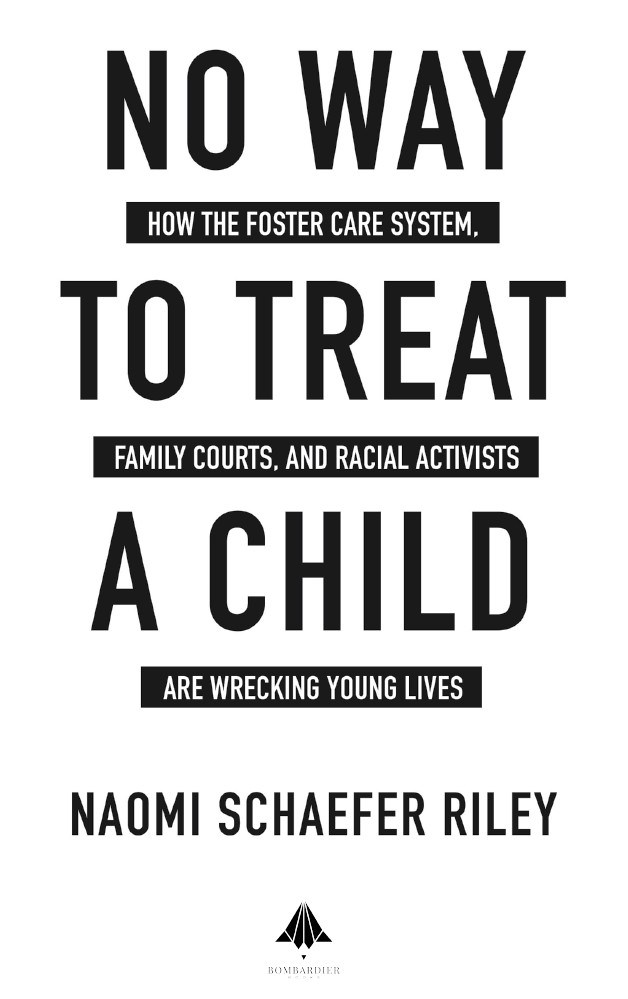
A BOMBARDIER BOOKS BOOK
An Imprint of Post Hill Press
ISBN: 978-1-64293-657-5
ISBN (eBook): 978-1-64293-658-2
No Way to Treat a Child:
How the Foster Care System, Family Courts, and Racial Activists Are Wrecking Young Lives
2021 by Naomi Schaefer Riley
All Rights Reserved
Cover Design by Tiffani Shea
No part of this book may be reproduced, stored in a retrieval system, or transmitted by any means without the written permission of the author and publishers.


Post Hill Press
New York Nashville
posthillpress.com
Published in the United States of America
In memory of Richar d Gelles,
a compassionate man and an uncompromisi ng scholar
*A note on names: Almost all the names of foster children and parents in this book have been changed to protect their identities. On a few occasions, if a child has been officially adopted and is no longer involved with the system, real names are used. In those instances, last names are listed as well.

Contents
I called it. Its not something Im proud of, but within hours of the announcement of the nomination of Judge Amy Coney Barrett to the Supreme Court in the fall of 2020, some friends were wondering exactly what her opponents might find to attack. I already knew the answer. The woman might as well be a saint, they told me. Did you know that she adopted two orphaned children from Haiti? they asked. Surely nothing in her personal life could be fodder. Oh , I thought, youd be surprised .
And there, like some kind of prophetic fulfillment, was Ibram X. Kendi on Twitter: Some White colonizers adopted Black children, the Boston University professor and author of the bestselling book How to Be an Antiracis t, wrote. They civilized these savage children in the superior ways of White people, while using them as props in their lifelong pictures of denial, while cutting the biological parents of these children out of the picture of humanity.
The idea that white parents caring for black childrenblack orphans, no lessis a form of colonization is not a new accusation. Indeed, it seems that the United States went almost right from a period in which interracial family relationships were illegalthe first official interracial adoption was in 1948to one in which white adults were criticized as patronizing bigots for wanting to care for children whose skin color did not match theirs.
Malcolm X made the accusation more than a half-century before Kendi. In 1938, Malcolms mother, Louise Little, suffered a nervous breakdown after her husband was murdered. Six of her children, including Malcolm, were sent to four different foster homes. Malcolm was placed with a white family. In his 1965 bestseller, The Autobiography of Malcolm X , which he coauthored with journalist Alex Haley, Malcolm lamented that Judge McClellan in Lansing had authority over me and all of my brothers and sisters A white man in charge of a black mans children! Nothing but legal, modern slaveryhowever kindly intentioned.
It wasnt long after that in 1972, when the National Association of Black Social Workers took up the cause, issuing a statement that took a vehement stand against the placements of Black children in white homes for any reason. The group called transracial adoptions unnatural, unnecessary, and artificial and argued that such placements were evidence of the continued chattel status of African Americans.
Next page

